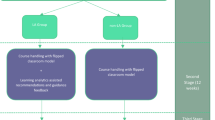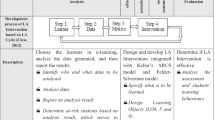Abstract
One of the main problems encountered in the online learning process is the low or absence of students’ engagement. They may face problems with behavioral engagement, cognitive engagement, emotional engagement in online learning environments. It is thought that the problems related to students' engagements can be overcome with personalized metacognitive feedback support based on learning analytics. In this research, the effect of personalized metacognitive feedback support based on learning analytics in online learning for recommendation and guidance was investigated on student engagement. The research was designed in conformity with experimental design, and it was performed on 68 first graders at a university in Turkey. The procedure was conducted within the scope of the Computing II Course based on online learning. The participants were randomly apportioned to experimental and control groups. Students in the experimental group were provided with personalized metacognitive feedback support based on learning analytics for recommendation and guidance. This support was not given to the control group. The personalized metacognitive feedback support used in this research consists of two basic components. These; (a) Learning analytics reports created with data obtained from students' weekly learning management system usage. (b) The second component of the feedback messages is the recommendations messages prepared personalized for each participant based on learning analytics reports. The data of the study was obtained by the students’ engagement scale which is used as pretest and posttest. The findings of the study revealed that the experimental group students' engagement was higher than the control group. Based on the research findings, it was seen that providing personalized metacognitive feedback based on learning analytics to students in online learning would improve students’ engagement. Therefore, it can be said that providing personalized metacognitive feedback based on learning analytics in online learning is a useful approach. This research has a novel and unique value in examining the effect of personalized metacognitive feedback based on learning analytics on students’ engagement. In line with the findings obtained from the research, various suggestions were made for educators, administrators, and researchers.
Access this article
We’re sorry, something doesn't seem to be working properly.
Please try refreshing the page. If that doesn't work, please contact support so we can address the problem.



Similar content being viewed by others
Explore related subjects
Discover the latest articles, news and stories from top researchers in related subjects.References
Arnold, K. E., & Pistilli, M. D. (2012, April). Course signals at Purdue: Using learning analytics to increase student success. In Proceedings of the 2nd International Conference on Learning Analytics and Knowledge (pp. 267–270). ACM
Baker, L., & Brown, A. L. (1984). Metacognitive skills and reading. Handbook of Reading Research, 1, 353–394.
Berland, M., Martin, T., Benton, T., Petrick Smith, C., & Davis, D. (2013). Using learning analytics to understand the learning pathways of novice programmers. Journal of the Learning Sciences, 22(4), 564–599.
Blakey, E., & Spence, S. (1990). Developing metacognition. ERIC.
Bolliger, D. U., & Halupa, C. (2018). Online student perceptions of engagement, transactional distance, and outcomes. Distance Education, 39(3), 299–316.
Bouta, H., Retalis, S., & Paraskeva, F. (2012). Utilising a collaborative macro-script to enhance student engagement: A mixed method study in a 3D virtual environment. Computers & Education, 58(1), 501–517.
Broughan, C., & Prinsloo, P. (2020). (Re) centring students in learning analytics: In conversation with Paulo Freire. Assessment & Evaluation in Higher Education, 45(4), 617–628.
Caliskan, M. (2015). Ways of providing effective feedback. Turkish Studies, 10(11), 417–430. https://doi.org/10.7827/TurkishStudies.8613
Campbell, J.P., DeBlois, P., & Oblinger, D.G. (2007). Academic analytics: A new tool for a new era. EDUCAUSE Review. Retrieved Jun 18, 2021, from: https://er.educause.edu/articles/2007/7/academic-analytics-a-new-tool-for-a-new-era
Chen, P. S. D., Gonyea, R., & Kuh, G. (2008). Learning at a distance: Engaged or not?. Innovate: Journal of Online Education, 4(3), 1–7
Cohen, J. (1988). Statistical power analysis for the behavioral sciences (2nd ed.). Erlbaum.
Delen, E., Liew, J., & Willson, V. (2014). Effects of interactivity and instructional scaffolding on learning: self-regulation in online video-based environments. Computers & Education, 78, 312–320.
Ergun, E., & Usluel, Y. K. (2015). The turkish adaptation of student’s engagements scale in online learning environment: A study of validity and reliability. Educational Technology Theory and Practice, 5(1), 18–33.
Fredricks, J. A., Blumenfeld, P. C., & Paris, A. H. (2004). School engagement: potential of the concept, state of the evidence. Review of Educational Research, 74(1), 59–109.
Govaerts, S., Verbert, K., Duval, E., & Pardo, A. (2012, May). The student activity meter for awareness and self-reflection. In CHI'12 Extended Abstracts on Human Factors in Computing Systems (pp. 869–884). ACM
Greller, W., & Drachsler, H. (2012). Translating learning into numbers: A generic framework for learning analytics. Journal of Educational Technology & Society, 15(3), 42–57.
Hattie, J., & Timperley, H. (2007). The power of feedback. Review of Educational Research, 77(1), 81–112.
Howell, J. A., Roberts, L. D., Seaman, K., & Gibson, D. C. (2018). Are we on our way to becoming a “helicopter university”? academics’ views on learning analytics. Technology, Knowledge and Learning, 23(1), 1–20.
Ibañez, P., Villalonga, C., & Nuere, L. (2019). Exploring student activity with learning analytics in the digital environments of the nebrija university. Technology, Knowledge and Learning, 25, 769–787.
Ifenthaler, D., & Widanapathirana, C. (2014). Development and validation of a learning analytics framework: Two case studies using support vector machines. Technology, Knowledge and Learning, 19(1–2), 221–240.
Ifenthaler, D., Gibson, D., Prasse, D., Shimada, A., & Yamada, M. (2020). Putting learning back into learning analytics: actions for policy makers, researchers, and practitioners. Educational Technology Research and Development. https://doi.org/10.1007/s11423-020-09909-8
Ifenthaler, D., & Yau, J. Y. K. (2020). Utilising learning analytics to support study success in higher education: a systematic review. Educational Technology Research and Development, 68(4), 1961–1990.
Junco, R., Heiberger, G., & Loken, E. (2011). The effect of twitter on college student engagement and grades. Journal of Computer Assisted Learning, 27(2), 119–132.
Junco, R. (2012). The relationship between frequency of Facebook use, participation in Facebook activities, and student engagement. Computers & Education, 58(1), 162–171.
Karaoglan Yilmaz, F. G. (2020). Modeling different variables in flipped classrooms supported with learning analytics feedback. Journal of Information and Communication Technologies, 2(1), 1–16.
Karaoglan Yilmaz, F. G., & Yilmaz, R. (2020a). Learning analytics as a metacognitive tool to influence learner transactional distance and motivation in online learning environments. Innovations in Education and Teaching International, 1–11.
Karaoglan Yilmaz, F. G., & Yilmaz, R. (2020b). Student opinions about personalized recommendation and feedback based on learning analytics. Technology, Knowledge and Learning, 25, 753–768.
Karaoglan Yilmaz, F. G. (2021). Utilizing learning analytics to support students’ academic self-efficacy and problem-solving skills. The Asia-Pacific Education Researcher. https://doi.org/10.1007/s40299-020-00548-4
Kujawa, S., & Huske, L. (1995). Strategic teaching and reading project guidebook. NCREL
Long, P., & Siemens, G. (2014). Penetrating the fog: Analytics in learning and education. Italian Journal of Educational Technology, 22(3), 132–137.
Ma, J., Han, X., Yang, J., & Cheng, J. (2015). Examining the necessary condition for engagement in an online learning environment based on learning analytics approach: the role of the instructor. The Internet and Higher Education, 24, 26–34.
Molenaar, I., van Boxtel, C. A., & Sleegers, P. J. (2011). Metacognitive scaffolding in an innovative learning arrangement. Instructional Science, 39(6), 785–803.
Ochoa, X., & Wise, A. F. (2021). Supporting the shift to digital with student-centered learning analytics. Educational Technology Research and Development, 69(1), 357–361.
Schumacher, C., & Ifenthaler, D. (2021). Investigating prompts for supporting students’ self-regulation–A remaining challenge for learning analytics approaches? The Internet and Higher Education, 49, 100791.
Seufert, S., Meier, C., Soellner, M., & Rietsche, R. (2019). A pedagogical perspective on big data and learning analytics: A conceptual model for digital learning support. Technology, Knowledge and Learning, 24(4), 599–619.
Siemens, G., & Gasevic, D. (2012). Guest editorial-learning and knowledge analytics. Journal of Educational Technology & Society, 15(3), 1–2.
Stipek, D. (2002). Motivation to learn: Integrating theory and practice. Allyn and Bacon.
Timothy, T., Chee, T. S., Beng, L. C., Sing, C. C., Ling, K. J. H., Li, C. W., & Mun, C. H. (2010). The self-directed learning with technology scale (SDLTS) for young students: An initial development and validation. Computers & Education, 55(4), 1764–1771.
Toro-Troconis, M., Alexander, J., & Frutos-Perez, M. (2019). Assessing student engagement in online programmes: Using learning design and learning analytics. International Journal of Higher Education, 8(6), 171–183.
Willms, J. D. (2003). Student engagement at school. A sense of belonging and participation, results from PISA 2000, OECD. www.oecd.org/education/school/programmeforinternationalstudentassessmentpisa/33689437.pdf
Yilmaz, R. (2020). Enhancing community of inquiry and reflective thinking skills of undergraduates through using learning analytics-based process feedback. Journal of Computer Assisted Learning, 36(6), 909–921.
Author information
Authors and Affiliations
Corresponding author
Additional information
Publisher's Note
Springer Nature remains neutral with regard to jurisdictional claims in published maps and institutional affiliations.
Rights and permissions
About this article
Cite this article
Karaoglan Yilmaz, F.G., Yilmaz, R. Learning Analytics Intervention Improves Students’ Engagement in Online Learning. Tech Know Learn 27, 449–460 (2022). https://doi.org/10.1007/s10758-021-09547-w
Accepted:
Published:
Issue Date:
DOI: https://doi.org/10.1007/s10758-021-09547-w




